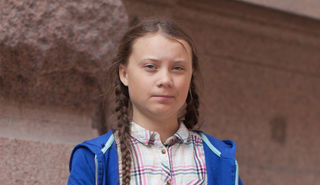Environment
Why Greta? Why Now?
How Greta Thunberg’s unique qualities are galvanizing the climate movement
Posted September 25, 2019 Reviewed by Gary Drevitch

I have been teaching young people about climate change for 32 years. In 1987, I taught week-long summer courses to middle school students at the University of Pennsylvania. One of those courses was on environmental issues, and another was on animal issues. Many of the young people in those classes became activists. Two started a Philadelphia-wide group called SPARE (Students Protecting Animals’ Rights and the Environment). They conducted protests, organized educational and letter-writing campaigns, lobbied legislators, and won awards.
I was activated, too. I realized after those week-long courses that I’d found my life’s work as a humane educator – someone who teaches about the interconnected issues of human rights, environmental preservation, and animal protection, and who educates others to be solutionaries for a just, sustainable, and peaceful world.
In 1989, I started a humane education program at a non-profit organization and began visiting schools, offering classroom presentations, assembly programs, mentoring for student clubs, and afterschool courses. By the time I left that job in 1996 to co-found the Institute for Humane Education and prepare teachers to be humane educators, my program was reaching 10,000 students a year.
Many of those young people were deeply passionate and dedicated. They had good ideas, spoke out, launched creative campaigns, and became changemakers. In terms of commitment, intelligence, and motivation they were not much different from Greta Thunberg, the 16-year-old Swedish activist who has catalyzed the largest movement to date to address the climate crisis.
In just one year, Greta has galvanized hundreds of millions of people. She has been written about and/or interviewed by virtually every major English-speaking news outlet. Her TED talk has been viewed almost 3.5 million times and translated into 32 languages. She inspired millions of young people to participate in the Global Climate Strike and walk out of school on September 20. Then, the following week, she spoke to the U.S. Congress and the U.N. General Assembly.
Why Greta?
Why not all the other people – young and old alike – who’ve spoken out, started organizations, run for president of the United States, or led teams of scientists to a virtually unanimous conclusion about the dire situation facing our planet and the necessity of action now?
Here’s what I think:
-
Greta is artless. She is not driven by a desire for fame and has no interest in being an icon. She does not seek to be believed. She is simply, and ferociously, asking that we study the science and heed it.
-
Greta is simultaneously soft- and slow-spoken, utterly candid, and intensely passionate, which makes her deeply compelling to listen to. We are brought to our knees by the blunt truth of her words, and we feel the power of her emotions, which are contagious and spur action.
-
Greta is heroic, and her integrity is her superpower. She is vegan. She won't fly. She puts the planet first. In her intense stare, we cannot help but look inward, examine ourselves, and hear the call to do better.
-
Greta is unique. Her Asperger’s translates into “you get what you see,” which is (as systems thinkers sometimes point out in relation to seemingly thorny problems) complex but not complicated. She is at once so angry and frustrated, so brilliant and capable, so honest and authentic, so dedicated and motivated, so deeply, fully humane. Those qualities don’t often show up together in a single human being.
-
Greta is disarming and demanding in equal measure. She disarms us by stating that we shouldn’t listen to her, but rather to the science, and then demands with vehemence that we do just that.
-
Greta is calling for political action, but not endorsing any particular politics. The only “side” she is taking is the side of the planet and its future generations. This invites everyone – even her detractors – to hear her voice as a personal call to embrace reality, which is not easily dismissable.
-
Greta is young, and looks younger. We adults are rightly being reprimanded by a child who is facing the potential degradation of the world in her lifetime. She is the voice of all youth crying out to be loved and respected in the most fundamental way—by safeguarding their future.
The psychological factors that come into play to make Greta the person who is inspiring action at this pivotal juncture are themselves complex, but perhaps not complicated, either. We are ready to listen because:
- The science continues to become ever more irrefutable and terrifying.
- We are being given soon-to-arrive data-based dates beyond which the doorway to shifting the horrific trajectory we are on may close.
- We are witnessing with our own eyes and bodies the impacts of global heating. Greta has arrived on the climate scene at precisely the moment when we may finally be ready to change.

As we look at the images of the millions of young people who participated in the Global Climate Strike on September 20, let’s remember two things.
First, Greta is inspiring this movement because she embodies the right qualities at the right time. And second, she is just the spark. We, not Greta, are responsible for building momentum so this moment doesn’t fade, and so governments and corporations heed the science before it is too late.


